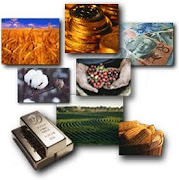In common parlance, commodities means all types of products. However, the Foreign Currency Regulation Act (FCRA) defines them as 'every kind of movable property other than actionable claims, money and securities.'
Commodity trading is nothing but trading in commodity spot and derivatives (futures). If you are keen on taking a buy or sell position based on the future performance of agricultural commodities or commodities like gold, silver, metals, or crude, then you could do so by trading in commodity derivatives.
Commodity derivatives are traded on the National Commodity and Derivative Exchange (NCDEX) and the Multi-Commodity Exchange (MCX). Gold, silver, agriculture commodities including grains, pulses, spices, oils and oilseeds, mentha oil, metals and crude are some of the commodities that these exchanges deal in. Trading in
commodities futures is quite similar to equity futures trading. You could take a long position (where you buy a contract) or a short position (where you sell it). Simply speaking, like in equity and other markets, if you think prices are on their way up, you take a long position and when prices are headed south you opt for a short position.
REGULATORY BODY FOR THE COMMODITY TRADING MARKET IN
The Forward Markets Commission (FMC) is the regulatory body for the commodity market in
WHAT KIND OF PRODUCTS CAN BE LISTED ON THE COMMODITY MARKET?
All commodities produced in the agriculture, mineral and fossil sectors have been sanctioned for futures trading. These include cereals, pulses, ginned cotton, un-ginned, cotton, oilseeds, oils, jute, jute products, sugar, gur, potatoes, onions, coffee, tea, petrochemicals, and bullion, among others.
WHAT ARE THE RISK FACTORS?
Commodity trading is done in the form of futures and that throws up a huge potential for profit and loss as it involves predictions of the future and hence uncertainty and risk. Risk factors in commodity trading are similar to futures trading in equity markets. A major difference is that the information availability on supply and demand cycles in commodity markets.
WHAT ARE THE FACTORS THAT INFLUENCE THE COMMODITY PRICES IN THE MARKET?
The commodity market is driven by demand and supply factors and inventory, when it comes to perishable commodities such as agricultural products and high demand products such as crude oil. Like any market, the demand-supply equation influences the prices.


